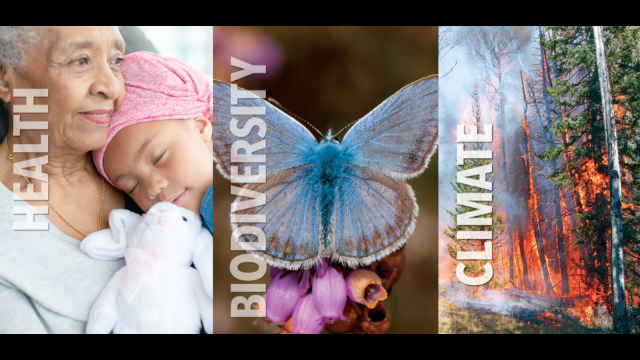18
Oct
Beyond Pesticides Announces 41st National Forum, Imperatives for a Sustainable Future, Starting Oct 30!

(Beyond Pesticides, October 18, 2024) On October 30 at 2:00pm (eastern time, U.S.), Beyond Pesticides convenes the first session (virtual) of its 41st National Forum: Imperatives for a Sustainable Future—Reversing the existential crises of pesticide-induced illness, biodiversity collapse, and the climate emergency. The Forum provides an opportunity to discuss with world-renowned scientists, from Germany and the United States, both (i) the hazards that define the urgency of threats associated petrochemical toxicants, with a focus on chemicals that disrupt the endocrine system (including pesticides) and lead to life-threatening diseases, and (ii) the strategy for adopting a path forward that tackles the problem holistically, rather than one chemical at a time.
What’s Happening on October 30 at 2:00pm (eastern time US)?
An opportunity: Meet Felix Löwenstein, PhD, author of Food Crash: Why Organic Is the Only Way Forward, just released in the United States.
- Focus: Adopt a holistic worldwide strategy to reverse the existential crises of pesticide-induced illness, biodiversity collapse, and the climate emergency.
- Vision: Explore Dr. Löwenstein’s passion, grown from his life as an agricultural scientist, farmer, international agricultural aid worker, and leader in Germany’s association of organic food producers and organic research.
- Mandate: Delve into the compelling facts about the adverse impacts of chemical-intensive agriculture on ecological and human health, food sovereignty, and animal welfare—and the viability, productivity, and profitability of the sustainable alternative now!
. . . And on November 14, at 1:00pm (eastern time US)?
An opportunity: Meet Tracey Woodruff, PhD, MPH, director of the Program on Reproductive Health and the Environment, School of Medicine, at the University of California San Francisco.
- Focus: Elevate understanding that links the deadly and debilitating effects of endocrine disrupting toxicants, including pesticides, plastics, and a wide range of manufactured products, to fossil fuels and the compelling science to support action.
- Vision: Explore the clinical effects and inequities associated with dependency on the range of endocrine disruptors, as Dr. Woodruff calls for decarbonizing the economy with a precautionary standard.
- Mandate: Apply scientific findings and uncertainties to policies and practices to address threats associated with serious health effects, biodiversity decline, and the climate crisis.
ABOUT THE PROGRAM
The Forum will address the increasing understanding that the world faces existential threats to health, biodiversity, and climate for which petrochemical-based pesticides and fertilizers, among other products, are major contributors—at the same time that solutions are currently available and operational. The threats are real and scientifically defined, and so are the solutions. The goal of the Forum is to contribute to the adoption of a holistic worldwide strategy to reverse the existential crises in the production of our food and the management of land and ecosystems.
The convenors explain that the 41st National Forum, Imperatives for a Sustainable Future, offers us an opportunity to elevate our understanding of the petrochemical threats and the critical need to adopt practices and policies that eliminate one of the major sources of the problem, petrochemical pesticides and fertilizers. Among the significant changes that will be discussed is the need for an accelerated transition to organic land management, from agriculture, landscapes to playing fields, as part of a holistic strategy that recognizes the multidimensional nature of the problem and solution.
A focus of the Forum is what Beyond Pesticides describes as two major imperatives for sustainability and a livable future that require community and decision maker understanding of and action on:
- The threats to human health and ecosystems and the dire consequences of inaction or measures that fall far short of what is necessary; and
- The path forward to eliminate reliance on petrochemical-based products, including the constellation of toxic materials associated with chemical-intensive practices—from food production to the management of homes, gardens, parks, and schools.
Session 1: October 30, 2024, 2:00 PM (Eastern time US)
 Felix zu Löwenstein, PhD
Felix zu Löwenstein, PhD
The Forum Series begins with an agronomist who has been farming organically on his family farm in Germany since the 1990’s, bringing a wealth of hands-on experience that informs the technical information that transformational change requires. In Dr. Löwenstein’s book, Food Crash: Why Organic Is the Only Way Forward, just released in the United States, the case is made that organic land management with “ecological intensification” provides society with a social good, as opposed to chemical-intensive (conventional) practices that have externalized health and environmental costs. The book’s thesis on the organic imperative is rooted in the facts about the adverse impacts of chemical-intensive industrial agriculture on human health, food sovereignty, the environment, animal welfare, soil erosion, and soil health.
With it being widely understood that reducing greenhouse gases must be accompanied by the drawdown of atmospheric carbon, the author explains the importance of eliminating petrochemical pesticides and fertilizers, and the essential role of soil in sequestering carbon. The history of the failed Green Revolution and continuing efforts of multinational chemical/seed companies to advance monoculture farming systems, genetically engineered seeds, and dependency on synthetic fertilizers is juxtaposed with the success of diversified organic production practices, which utilize on-farm composting, the natural cycling of nutrients, and rotations with leguminous plants such as clover, alfalfa, and beans. Most importantly, Dr. Löwenstein is focused on “What To Do,” taking urgent action with at least three objectives: (1) require cost of harm to be internalized to the polluter, (2) incentivize organic production and consumption with tax policy, and (3) elevate consumer knowledge and awareness about the personal and societal benefits of organic.
Dr. Löwenstein’s passion for organic transition has grown from his life as an agricultural scientist, farmer, international agricultural aid worker, and leader in Germany’s association of organic food producers and organic research.
Session 2: November 14, 2024, 1:00 PM (Eastern time US)
 Tracey Woodruff, PhD, MPH
Tracey Woodruff, PhD, MPH
The conversation continues with the Alison S. Carlson Endowed Professor in the Department of Obstetrics, Gynecology, and Reproductive Sciences and the director of the Program on Reproductive Health and the Environment, School of Medicine, at the University of California San Francisco. Dr. Woodruff’s work focuses on uncovering and addressing environmental determinants of disease and health inequities and has written groundbreaking material on endocrine disrupting chemicals.
Dr. Woodruff’s research studies the harmful effects of chemicals and pollutants on health, pregnancy, and child development. She leads efforts to translate scientific information into actionable change in the clinic environment and through public policy. Previously, she has served as a senior scientist and policy advisor for the U.S. Environmental Protection Agency’s Office of Policy.
In a recent piece in The New England Journal of Medicine, Health Effects of Fossil Fuel–Derived Endocrine Disruptors, Dr. Woodruff highlights the urgent need to address the widespread chemical pollution stemming from the petrochemical industry, underscoring the dire implications for public health. She emphatically states, “We need to recognize the very real harm that petrochemicals are having on people’s health. Many of these fossil-fuel-based chemicals are endocrine disruptors, meaning they interfere with hormonal systems, and they are part of the disturbing rise in disease.”
Petrochemical exposure through air, water, food, and land is increasing and the health problems induced by endocrine disruptors require broader understanding among health care professionals and a more robust regulatory response, with recognition of disproportionate harm to people of color communities. In raising these issues, Dr. Woodruff is sounding the alarm to decarbonize and detoxify our economy with a precautionary approach.
To register for the Forum, Click here or go to bp-dc.org/2024-national-forum. Click here to access last year’s Forum webpage (and Daily News post)!










